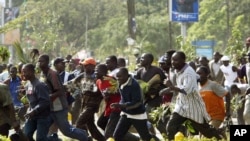NAIROBI —
Amnesty International is raising concerns about the ability of Kenyan police to handle possible election-related violence as the country prepares for the March 4 polls. The rights group says delays in reforms mean that many of the same police structures in place during the deadly 2008 post-election violence still exist.
Amnesty International acknowledges that progress has been made in bringing the entire police force under one structural command, and the appointment of David Kimaiyo as Kenya's new inspector general of police.
But according to the group’s country director, Justus Nyang’aya, police officers on the ground have not changed their attitude and the way they carry out their duties.
“2007-2008 violence several people died, several people were displaced, it was actually managed by the system of the police that we are still having today," he said. "Nothing has changed in terms of attitude, nothing has changed in terms of training especially for the police to be able to manage the use of force.”
Kenya’s last general elections in 2007 were marred by post-election violence - much of it between ethnic groups - in which more than 1,100 people were killed and more than 300,000 displaced from their homes. Police were unable to stop the violence, prompting calls from leaders and the public for police reforms.
A 34-page report from Amnesty documents continued human rights violations by the police, including arbitrary arrests, extra judicial killings and other abuses.
The rights group says the security forces have also failed to protect the people of coastal Tana Delta region, where two rival communities recently attacked each other, killing 200 people and driving more than 100,000 from their homes.
Presenting his presidential papers to the Independent Electoral Boundaries Commission, Prime Minister Raila Odinga called on security forces not to take political sides during elections.
Nyang’aya says that during the 2007 elections and the violence that followed, some of the police took sides and used excessive force against opposition supporters.
“We want a professional police, we want a police that will be neutral," he said. "We want a police that will not take sides in looking the issues of election and supporting one side, as had happened 2007-2008, where there were opposition candidates the police in fact killed people in that area.”
Earlier this week Odinga rejected police appointments made by President Mwai Kibaki, citing lack of consultation and constitutionality of the appointments.
Amnesty International warns that failure of the police reforms may mean the March 4 polls may not be free of violence.
Amnesty International acknowledges that progress has been made in bringing the entire police force under one structural command, and the appointment of David Kimaiyo as Kenya's new inspector general of police.
But according to the group’s country director, Justus Nyang’aya, police officers on the ground have not changed their attitude and the way they carry out their duties.
“2007-2008 violence several people died, several people were displaced, it was actually managed by the system of the police that we are still having today," he said. "Nothing has changed in terms of attitude, nothing has changed in terms of training especially for the police to be able to manage the use of force.”
Kenya’s last general elections in 2007 were marred by post-election violence - much of it between ethnic groups - in which more than 1,100 people were killed and more than 300,000 displaced from their homes. Police were unable to stop the violence, prompting calls from leaders and the public for police reforms.
A 34-page report from Amnesty documents continued human rights violations by the police, including arbitrary arrests, extra judicial killings and other abuses.
The rights group says the security forces have also failed to protect the people of coastal Tana Delta region, where two rival communities recently attacked each other, killing 200 people and driving more than 100,000 from their homes.
Presenting his presidential papers to the Independent Electoral Boundaries Commission, Prime Minister Raila Odinga called on security forces not to take political sides during elections.
Nyang’aya says that during the 2007 elections and the violence that followed, some of the police took sides and used excessive force against opposition supporters.
“We want a professional police, we want a police that will be neutral," he said. "We want a police that will not take sides in looking the issues of election and supporting one side, as had happened 2007-2008, where there were opposition candidates the police in fact killed people in that area.”
Earlier this week Odinga rejected police appointments made by President Mwai Kibaki, citing lack of consultation and constitutionality of the appointments.
Amnesty International warns that failure of the police reforms may mean the March 4 polls may not be free of violence.
